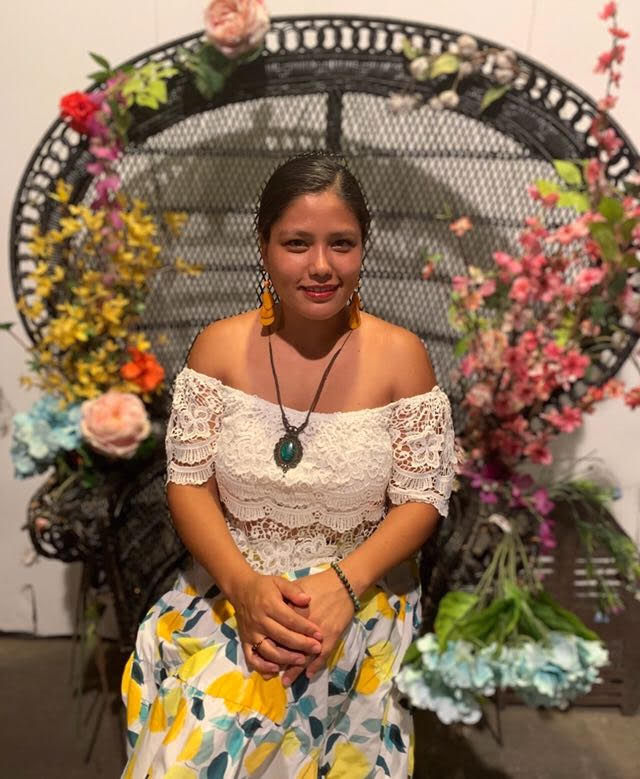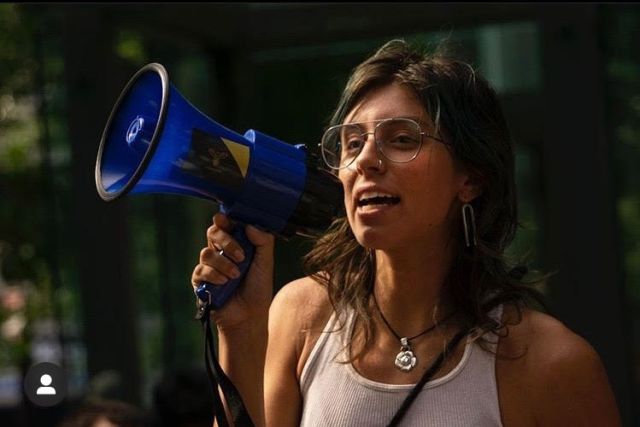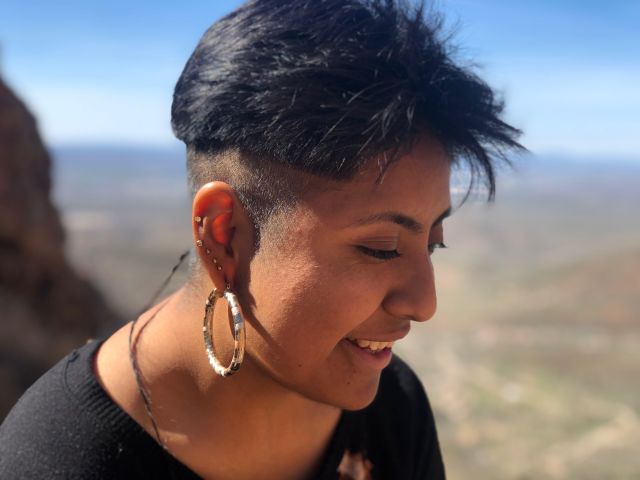Community organizing always involves a bit of time travel. To win so many of the things that our people need right now, we must learn from the past and build for the future.
This process is not linear. As we fight and organize for the major political transformations that will make our world more just — such as permanent protection for all undocumented immigrants and an end to deportations — we also need to put our vision into practice on a daily basis, because our communities can’t wait.
For Movimiento Cosecha, the immigrant-led popular movement that I have been part of for the last three years, this work takes many forms. It looks like organizing undocumented workers to believe in and fight for a world where they can safely live with basic dignity and respect. It looks like studying our community’s history to better understand what immigrants need to win today. And it looks like finding new ways to work together that cultivate people power, reciprocity, and interdependence in a country that disempowers, exploits and isolates us.
Since 2015, Cosecha has grown a national decentralized movement of immigrant leaders supported by full-time volunteer organizers living in “voluntary simplicity.” There is no roadmap to our ambitious final goal: mobilizing millions of undocumented workers to participate in an unprecedented immigrant general strike. But sometimes you have to build the plane and fly it; sometimes you have to build a new world and live in it every day.
![]()
Today, our time travel is particularly acute: The conversation below originally took place on March 10, immediately following a week-long organizer retreat full of big and bright plans for the future. Brimming with excitement, I brought together some of the brilliant organizers I live and work with to reflect on the joys, challenges, and complexities of our movement building.
I’m writing these words now in another, darker world on March 16. To be honest, I don’t yet know what world you’ll be in when you read them.
It is surreal to write about hope and futurity amidst a global pandemic that disproportionately threatens the health, safety, and livelihoods of millions of undocumented workers. As our work and campaigns shift drastically, we — along with the rest of the world — are trying to find answers to unanswerable questions: How long will this last? How can we defend and support each other? If we make it through this, what world is waiting on the other side?
For now, this is my offering: a transmission from the past, which is also the future.
![]()

Ale. Born in the obligo de la Luna (the center of the Moon), Mexico City. Community organizer with Movimiento Cosecha. Creating power among WOC and QPOC. She believes that in order to continue organizing we must prioritize and practice self and collective healing. Ale is a guerrera with a free spirit fighting for liberation and the seed the seed that her ancestors cultivated so the world continues evolving with magic, love, kindness and compassion. You can follow her on Instagram @alejandraprimavera.

Camilo was raised in Atlanta, GA with Jewish ancestry and roots in Colombia. Camilo is a GNC poet and and organizer with Movimiento Cosecha, a movement working to win respect, dignity and permanent protection for all undocumented immigrants in the U.S. Camilo believes in the power of intimacy, dance and collective memory and care in making a new reality. You can follow their work and adventure on Instagram @pollen.boy_.

Cata Santiago is an organizer with Movimiento Cosecha. She is a dedicated leader from Homestead, Florida and Cata hails from the mountains of Oaxaca, Mexico, who builds power in her community with passion, humor and heart. As the daughter of farmworkers, Cata embodies the strength and courage of the communities that she supports. She inspires those around her to believe that change will come, and it will come from the leadership of those on the front lines, working hard and taking action. She has organized rallies, marches and actions around the country in the path towards dignity, respect and permanent protection for all immigrants in this country. You can follow her on Instagram @cata_morphosis.
![]()
Christine: Hey, friends! Let’s start off easy. How would you explain Cosecha and our volunteer organizer network to someone?
Ale: Cosecha is a nonviolent movement fighting for permanent protection, dignity and respect for all the undocumented people in this country. Permanent protection is about finally being able to be free to move, to return to our home countries, visit our families and not be scared in our daily lives. But we know even if we get residency or citizenship, people will not suddenly start to respect the immigrant community, so we are fighting for that too.
This country depends on the labor of undocumented immigrants. Our strategy is to organize our people and use our economic and labor power to win those things we need, ultimately with an immigrant strike.
Cata Santiago: The volunteer organizing network is a group of full-time organizers living in “voluntary simplicity,” which means we aren’t receiving a salary. This model has been used by other social movements in the past, like the United Farm Workers. All our basic needs, such as transportation, food, housing, are met through collective funds for the movement.
We believe in creating intentional community and something called relational culture with each other. That means we support each other, not only in our organizing work, but we’re also trying to create new ways of relating to each other that are reflective of a better world that we’re trying to build.
Our work isn’t 9-to-5. We need to actually support people in a holistic way and have each other’s backs. We are literally fighting against the U.S. government, which is working all the time to diminish our humanity. So we have to build a culture that can hold us together and be the glue for those moments that test us.
Christine: What does it actually look like and feel like to live that way? Are there any powerful examples that come to mind for you?
Ale: We live in communal houses together in different parts of the country where we are running campaigns. We have meals together and go to work together. And living together is the work, too, so we have roles within the houses. We use different cultural practices to really check in with people, not just about the work they need to get down, but about their lives, their feelings. We prioritize community time together — we’ll make dinner or go for a hike together.
Cata: Yeah, there’s something important about this idea of unstructured, organic time to build and deepen relationships. I used to have an organizing job that was very structured. I had a cubicle! I was very much in my own little square footage. It was rigid and you could just feel the caca energy. Here, we have intentionality around being together in different ways.
The organizing meetings we have with community members reflect that, too. We have meetings over tacos, you know? I think that has played a key role in why people actually come back. You build a commitment to specific people in your shared struggle, and that builds commitment to the movement. People feel seen and organically build deep connections.
Camilo: When we were first starting our campaign for driver’s licenses in Massachusetts and lots of people were coming to meetings, our communal organizer house was a place to invite people too. It was not just for the full-time organizers, but for the whole community growing around the campaign. I remember this night when a leader came over and cooked all this delicious Peruvian food. We had community members from all over come and it was just this space where we could express joy and celebrate over food together. There weren’t the strict confines of “this is organizing, we are in a meeting to develop you as leaders.” We just shared with each other in a human way.
Cata: Yes! I think there’s a paradigm shift around how people see themselves. Because a lot of messaging in the immigrant rights movement focuses on victimization. Saying, I am a victim. I think that actually increases the fear-mongering and the dehumanization and impacts how you see your value and worth. Here, people can have a different experience: I am joy. I am fucking happiness! I don’t have to constantly shed tears or tell my sob story to be part of this movement.
Ale: That is also how we connect more with the community. Even if we are immigrants, sometimes we can have detachment from the community. So what we are doing challenges the idea of a big separation between “organizer” and “community member” and helps us really deepen relationships.
Christine: All of us have been part of Cosecha for several years now. We are actually putting this ambitious, powerful vision into practice. What still resonates the same way as in the beginning? What has been really hard to live out?
Ale: One thing for me that was true at the beginning and is still so true now is our principle that “everything we need is in our community.” I see it whenever we organize big events. A few years ago, we organized a huge posada in Homestead, Florida and we were worried we would need to pay for everything ourselves. But then people let us use their space, and then a dozen people showed up with food, tamales, ponche, everything we needed. It’s like that in the campaign I’m part of now in Michigan, too. We sometimes worry, how are we going to get food for the meeting? But someone always brings it, always. That really stays with me.
Cata: Something that made me fall in love with Cosecha was a vision to go beyond what the immigrant rights movement had been doing for years, focusing on politicians in D.C. Trying to lobby for the Dream Act or comprehensive immigration reform. Cosecha didn’t want to be confined by the same strategies. We believe that power actually lies with the people. Our labor. Our ability to mobilize in the streets. So many immigrants relate to that. They don’t want to elect Democrats and lobby politicians. They want to build something else and imagine a new way to fight. That has stood the test of time.
Still, I think we do face questions about the sustainability of full-time voluntary simplicity in our organizing network. It’s challenging. In the vision of not receiving salaries, we are also committing to try to meet our needs in different ways, outside of the market. We’re still navigating what those support systems can look like, to care for people in all their complexities and to really center our own well-being. If we don’t balance it well, it can look like martyrdom, or the savior complex you tend to see in non-profits.
Camilo: To be honest, a lot of other challenges come from cohabitating with people you’re organizing with. We know that we’re there together not because we chose each other as friends or roomies, but because we believe in certain values and have a shared vision for liberation. That’s a very different way to live and co-create. And I think it’s a very beautiful experiment. But I don’t want to romanticize it either, because it can be very challenging. We also come from different cultures and levels of privileges and lived experiences. Knowing that we’re all here for something larger is what pulls us through those challenging moments.
Cata: Sometimes, with all the attacks on our community, we’ve had to work at such a fast pace. We’ve responded to big national moments in powerful ways, but that shit is tiring. I’ve seen a lot of us extend our capacity or not know how to say no. Taking care of ourselves as a collective is still something we’re figuring out. We won’t win if we’re just tired out and spread thin and overworking ourselves — that’s just capitalism working at its finest.
Christine: I want to go back to what you said earlier, Cata, about joy. I really loved that. What are things that have brought you guys joy, hope, and excitement?
Camilo: Right now, we are in the process of really trying to expand the intentional community we are creating. Our relational culture is not just for full-time organizers, or even just for the top immigrant leaders leading our campaigns, it’s for everyone. Everyone can be part of our culture of collective care. That’s what gives me hope. We want to truly reflect a world where we see each other in all our humanity and with care.
Ale: In our last few years, we have experienced some real challenges around personal conflict. We can only move at the speed of trust. If our culture is bad and we don’t trust each other, we cannot organize. We have to be vulnerable so that we can do conflict resolution and restore our relationships. It brings me a lot of hope that we are slowing down to do that.
It also brings me a lot of joy and hope to see the community leading. Our people are ready to be leaders. They aren’t waiting for someone else to bring them a plan. Oh, and the deep relationships I’m creating with people, which I know will continue after la huelga, after we win. These organized communities will continue to fight towards liberation; that’s beautiful and joyful to see.
Cata: I think the process of putting your belief system into action lets us live out our fullest lives. We’ve confronted a lot of challenges in the last few years. When space is created to let pain breath and have a seat with it, it’s transformative. And it’s hard, but we’re leaning towards it. We are grappling with a lot of our challenges by loving up on each other and valuing those relationships.
Like Ale was saying, being in the struggle together fosters trust, and trust goes a long way. I feel hope in knowing that we are fighting for our community to have a dignified way of life and that does not end with winning citizenship.
Christine: Alright, final question. A lot of people see elections as a major part of creating change, and we have an extremely anti-immigrant president and an election in November.
But, as you all know, Cosecha doesn’t support political candidates or get involved with electoral politics the way that many other organizations do. Why is that? And in this political moment, as people directly impacted by this administration in many ways, why are you choosing to do this work?
Camilo: One of the core beliefs of Cosecha is that political power comes from the people. Real changes in society will always come from popular mobilizations, not this vertical view of top-down power. Regardless of who holds the presidency, we know the work is with the people. In many ways, an election is not as important as the work we’re doing on a daily basis.
I know heteropatriarchy and capitalism will continue to exist and shape our lives and the ways we relate to each other. For me, my work is around learning to take care of people in a collective way, learning how to be accountable, learning how to see people through conflicts and pain and hold them in their humanity and understanding ways to practice restorative justice.
Cata: When it comes to candidates and the immigrant community, we know who this two-party political system serves, and it’s not us. Obama strengthened the deportation machine and deported 3 million people. We genuinely don’t believe the answers for our community lie in the White House. They lie where the community is. It’s about people power and how people can enact change by taking matters into their own hands. We have to continue what we’ve been doing, which is building at the grassroots level, strengthening our relationships into fully living out interdependence within the volunteer organizer network and our whole movement.
With the community we are working with, the immigrant community, we are not U.S. citizens, we cannot vote. But that doesn’t mean that we don’t have power, not at all. We can do so many things to build the world we want to see. That work is much deeper than just elections. Our work is constructing communities, creating relationships, dismantling white supremacy and dismantling patriarchy. At the end of the day, our work is about learning together.
![]()
To directly support undocumented workers and families during the pandemic, please contribute to Movimiento Cosecha’s new Undocumented Worker Fund. We truly believe that all the resources we need, including financial, are already in our community now. Chip in whatever you can to help immigrants buy food, pay rent, and meet other basic needs in this difficult time. 🔮
Edited by Carmen









Comments
I love this roundtable, and every time I read it I learn something new. Thank you for such a gift, Christine.
Thank you for this article. It’s helping me think about different ways of working towards change.